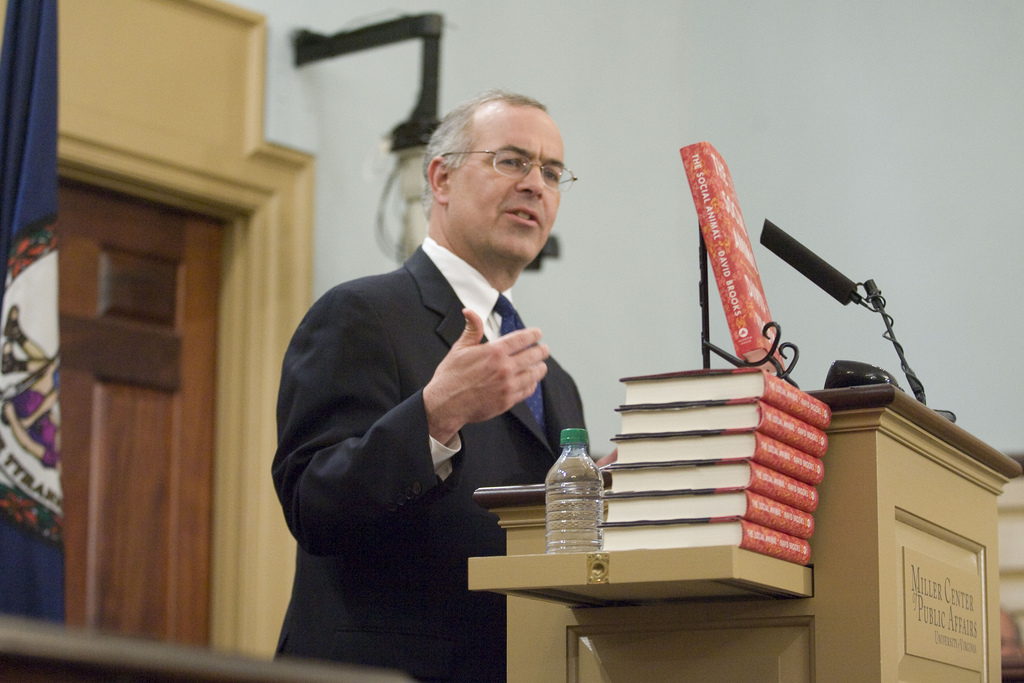Views expressed in opinion columns are the author’s own.
A great debate is underway over what the anti-Trump coalition should stand for, and New York Times columnist David Brooks has unfortunately inserted himself into the conversation. In a column modestly titled “The Future of the American Left,” he warns that the left risks embracing a type of economic authoritarianism fueled by nationalism and identity politics.
Brooks is wrong about those specific threats, but he’s not wrong that ideological corruption risks neutering the Resistance. The real threat, though, is institutional conservatism: a blind love for — and faith in — American institutions that overlooks respect for the human person and the earth.
[Read more: UMD students reflect on the one-year anniversary of Trump’s election]
But first, a quick note about definitions. Brooks appears not to know any real-life leftists, who almost universally understand the term “left” to mean anti-capitalist politics. He seems to define members of the “left” as Democrats, the Resistance or those to the Republican Party’s left. So this column will talk about the topic of Brooks’ column — the broader coalition of anti-Republican folks — rather than the smaller anti-capitalist left.
Now, let’s get down to Brooks’ fear about the “left”: economic authoritarianism, which he says will come from two sources — nationalism and identity politics.
Brooks’ evidence for resurgent economic nationalism is paltry. He uses a Bernie Sanders quote rejecting completely open borders to suggest Sanders opposes a “more open” immigration system. Sanders, of course, supports a more open immigration system, as do almost all Democrats, progressives and leftists.
And while many progressives and leftists criticize free trade deals, it’s mostly because the deals increase economic inequality, facilitate horrifying work conditions abroad and decimate American industries. There’s simply no parallel between Trump’s xenophobic nationalism and reasonable caution about free trade among progressives.
I won’t say too much about the identity politics bit, about which I’ve written at some length. Suffice to say identity is a defining feature of all politics. For both good and bad, Americans have always organized around shared identity, whether as workers, as women or as whites.
When folks rail against identity politics, they’re usually upset about identity groups raising grievances they believe to be illegitimate or overblown. But racism, sexism and Islamophobia are major structural barriers to human equality, so I have no problem with people organizing around identity to combat those forces.
Brooks is wrong about economic authoritarianism, but he’s not wrong that the anti-Trump Resistance risks ideological corruption. That corruption is most likely to come from institutional conservatism, an abiding respect for institutions — especially law enforcement and the military — that are quite frequently constructed to do people harm.
One of the most dangerous threads in Resistance thought is that Trump is a complete aberration. This form of “Trump exceptionalism” holds that the president has no real historical forebears, that he’s a uniquely malign force in American life. Adherents of this view long for a return to pre-Trump politics and have become enamored of establishment institutions.
Indeed, “institution” is one of the Resistance’s favorite words. As in, “Trump’s waging a war against institutions,” or, “Let’s hope our institutions can stand up to Trump.” Because Trump’s criminality is compulsive, lots of anti-Trump folks have a particular affection for law enforcement institutions.
Many Democrats have fallen in love with former FBI directors James Comey and Robert Mueller, both of whom are Republicans. A GoFundMe to pay the pension of fired FBI official Andrew McCabe raised more than half a million dollars. Anti-Trump folks have laid their hopes in military figures like James Mattis and H.R. McMaster. Even representatives of financial institutions, such as Goldman Sachs alumni Gary Cohn and Dina Powell, have some Resistance cachet.
To be clear, Trump is a lawless president, and in a clash between Mueller and Trump, I’m firmly with Mueller. Powerful institutions can encourage stability. But by placing faith in such institutions, the Resistance risks its soul.
[Read more: The Trump administration’s new immigration plan is a crime against due process]
Love for institutions is a deeply conservative impulse, one that prizes stability over liberation and stasis over progress. As The Atlantic’s Ta-Nehisi Coates wrote, “The danger of a conservative approach, of too much respect for institutions, is that it’s liable to deeply underestimate that rot eating away at the girders.”
Any meaningful progressive movement should be suspicious of institutions. The FBI has a long history of surveilling and abusing minority activists; many of the “reasonable” generals in the Trump administration were leaders in the greatest crime of the 21st century; financial institutions like Goldman Sachs are responsible for zapping trillions of dollars of wealth.
The left, at its core, should be about encouraging human freedom and flourishing, and that means liberating people from the constraints of institutions. If the anti-Trump movement becomes controlled by institutional conservatives, it has little hope of providing a brighter alternative to the Trump years.
Max Foley-Keene, opinion editor, is a sophomore government and politics major. He can be reached at opinionumdbk@gmail.com.



